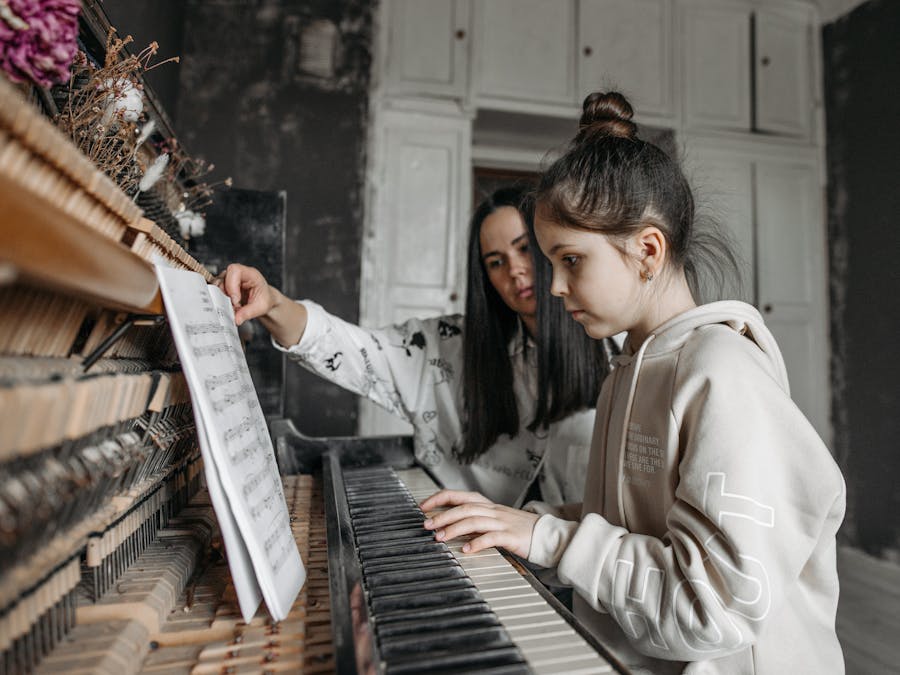 Piano Guidance
Piano Guidance
 Piano Guidance
Piano Guidance

 Photo: Inga Seliverstova
Photo: Inga Seliverstova
Music came FIRST. The language part came later. Pulling together evidence from infant development, language acquisition, and music cognition, the authors explored the roles of and interactions between music and language. This led them to hypothesize that language is better thought of as a special type of music.

Jumping sports demand athleticism and accuracy from both horse and rider, with difficulty rising with the fence height and course complexity. There...
Read More »
A master key is a key that opens several different locks, related in some way, within a master key system. For example, an elementary school may...
Read More »Which came first: language or music? Traditionally, music has been considered an evolutionary by-product of language. Language, after all, is one of the few skills we have that makes us uniquely human. Thus it has the more important evolutionary role. Music is just "auditory cheesecake." Unimportant. Pretty little fluff. A misunderstood by-product. But this tradition is changing. Researchers and authors like Daniel Levitin, Michael Thaut, Ian Cross, Silvia Bencivello, and David Huron are challenging our views of music's role as an evolutionary adaptation. They have suggested—and provided preliminary evidence for—the theory that music is not an unnecessary by-product, but is instead a critical and core function of our brain. Consider the following: The modern human brain came into being 50,000 to 100,000 years ago. There is archaeological evidence—cave drawings, artistic weaponry, sculpures—that are as old as 70,000 years. The oldest musical instrument, a bone flute dated at 40,000 years old, was discovered in Germany a few years ago. It's not a large leap to think that singing emerged before more sophisticated wind playing. This archaeological evidence provides support for the idea that artistry, creativity, and music were a part of our ancestors' lives as the modern human brain was developing. One core feature of evolution is "survival of the fittest," that the genes of those who lived long enough and reproduced were the ones that got passed down. And those who survived were those who were good at problem-solving. They figured out ways to live through cold winters and avoid the tigers. Being creative helps one problem-solve, which in our example helps one survive and leads to the idea that it's the creative brains that got passed down from our ancestors. Evolutionary development is often considered to mirror child development. Singing, dancing, and playing are important ways through which all children learn cognitive, language, social, and emotional skills. Perhaps it is through singing, dancing, and playing that early humans developed their cognitive, language, social, and emotional skills as well. These are some of the ideas, evidence, and theories being considered to help explain the evolutionary purpose of music. There may now be another piece to the puzzle—a theoretical piece, anyway. Researchers at Rice University’s Shepherd School of Music and the University of Maryland, College Park (UMCP) are theorizing that, when it comes to music, language, and evolution, we've got it all backwards. Music did not emerge as a result of the emergence and development of language. Music came FIRST. The language part came later. Pulling together evidence from infant development, language acquisition, and music cognition, the authors explored the roles of and interactions between music and language. This led them to hypothesize that language is better thought of as a special type of music. The music developed first and provides the foundation—from an evolutionary and a developmental standpoint—for language acquisition. When it comes to the adaptive role and purpose of music, there is still a lot to learn. The evidence is not yet strong. But clues continue to emerge that each contribute to our understanding of the adaptive role this "auditory cheesecake" called music has in our lives. If you are interested in reading more about the connection between music and evolution, I recommend the following books:

Whether you're playing drums (over 100 decibels, or dB), rehearsing with other musicians (guitar amps can reach 120 dB), or hitting up a concert...
Read More »
Cultural stereotypes and social conditioning can be one major reason for having fewer female guitarists. The belief that females play the piano,...
Read More »“Is the violin harder to learn than the guitar?” The short answer is: Yes, the violin is harder to learn than the guitar. There are several reasons for that. First of all, the violin does not have a fretboard, which means you will have to find every tone by ear.
A comparison between the violin and the guitar and which one is easier to learn. I know that many of my regular readers are currently playing the violin, but are thinking about picking up another instrument besides their main hobby. Next to the piano, the guitar is one of the most popular instruments for violinists to pick up. Some of you might also still be on the brink of choosing which instrument to learn: the guitar or the violin. In this article, I will give you a comparison between the violin and the guitar – and which one I think is easier to learn.

60% keyboards are a little more challenging to learn, but provide excellent space and weight savings compared to TKL and full-size keyboards. That...
Read More »
Music's Rule of Three. The idea is to have only three musical phrases playing at any one time in your song. Going beyond three or four elements at...
Read More »
The key of G major mostly uses the notes of the G major scale, which are G, A, B, C, D, E, and F♯. The key signature has one sharp, F♯, and its...
Read More »
When seeking a music teacher: Consult with friends, family and others who are acquainted with teachers in your community. Ask for recommendations...
Read More »